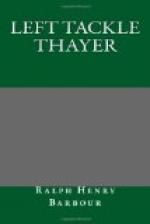[Illustration: “Funny you didn’t make a success of it!” chuckled Clint]
“Brooks and Chase have won one set and they’re three—love on this, Amy,” replied the boy addressed.
“Thought so,” said Amy. “I picked them to meet Scannel and Boynton. And I’ll bet they beat ’em, too.”
“Why didn’t you enter the doubles?” asked Clint.
“Oh, I had enough to do looking after the thing,” replied Amy, “and getting through the singles.”
Clint smiled. “I reckon the real reason was that you didn’t want to hog the show and take both prizes, eh?”
“No fear of that, I guess,” answered the other evasively. “Aren’t you coming over to the gym with me?”
“I’ll wait for you over yonder,” said Clint. “Conklin says I mustn’t use this leg very much. Hurry up and come back. I’ll be on the stand over there.”
The second was still practising when Clint reached the seats, some of them tackling the dummy in the corner of the field and others, backs and ends these, catching punts. Over on their own gridiron the ’varsity was hard at it, the two squads trotting and charging about under the shrill commands of Marvin and Carmine. Presently the rattle and bump of the dummy ceased and the tackling squad returned to the gridiron and “Boots” cleared the field for signal work. The backs and ends came panting to the bench, and Captain Turner, spying Clint in solitary grandeur, walked over to the foot of the stand.
“How’s the knee, Thayer?” he asked anxiously.
“Much better, thanks,” replied Clint, more optimistically than truthfully. Turner nodded.
“That’s good,” he said approvingly. “Go easy with it, old man, and don’t take chances. Conklin says it’s only a bruise, but knees are funny things. You don’t want to get water on it. We need you too much, Thayer. Come on down to the bench.”
“Thanks, but I’m waiting for Byrd. Did Conklin say how long I’d be out?”
“No, but you needn’t worry, I guess. A couple of days more will put you all right.” Turner nodded and hurried back to where “Boots” was making the line-up. When the squad took the field Clint saw that Cupples had taken his place at right tackle and that Robbins was at left. This, he reflected with some satisfaction, was doubtless because Robbins was not quite so good as he, Clint, and the left of the ’varsity line was the strongest. Hinton’s piping voice sang the signals and the squad, followed by the substitutes, began its journeys up and down the gridiron. Amy joined Clint presently, still lugging his pewter trophy, and the two boys leaned back against the seat behind them and looked on. Clint, when the squad was near enough for him to hear the signal, translated for Amy’s benefit, as: “Right half outside of left guard. Watch it!” or “Here’s a forward to Turner, Amy. There he goes! Missed it, though. That was a punk throw of Martin’s.”
“It’s all well enough for you fellows to pretend that you know what’s going to happen when the quarter-back shouts a lot of numbers to you,” observed Amy, hugging his knees and exposing a startling view of crushed-raspberry socks, “but I’m too old a bird—no pun intended this time—to be caught. Besides, I played once for a couple of weeks, and I know that signals didn’t mean anything to me.”




